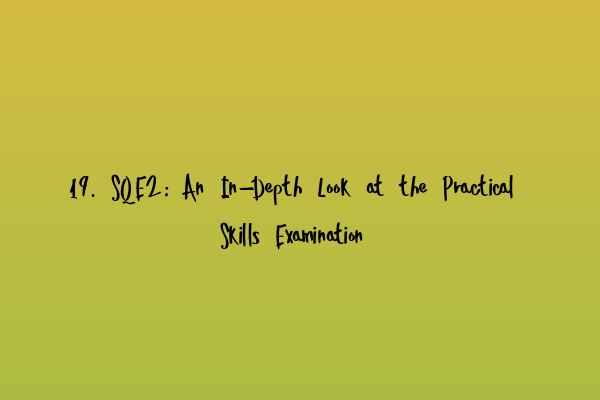19. SQE2: An In-Depth Look at the Practical Skills Examination
Aspiring solicitors have long been accustomed to the traditional route to qualification, which involved completing a law degree, followed by the Legal Practice Course (LPC), and then securing a training contract. However, a new era is dawning in the legal profession with the introduction of the Solicitors Qualifying Examination (SQE). In this blog post, we will take an in-depth look at the practical skills examination of SQE2 and explore what it means for future solicitors.
What is SQE2?
The Solicitors Qualifying Examination (SQE) is a new two-part assessment introduced by the Solicitors Regulation Authority (SRA) to replace the traditional route to qualification. The second part of the exam, SQE2, is focused on assessing candidates’ practical legal skills. It is designed to ensure that aspiring solicitors have the necessary competencies to perform effectively in practice. SQE2 evaluates a wide range of skills, from legal writing and research to advocacy and legal drafting.
The Structure of SQE2
SQE2 consists of three assessments:
- Client Interview and Advocacy
- Legal Writing and Drafting
- Legal Research and Writing
Client Interview and Advocacy
This assessment focuses on the candidate’s ability to effectively communicate with clients and present legal advice. Candidates are expected to demonstrate their active listening skills, ability to analyze information, and provide appropriate advice in a simulated client interview. The advocacy component of this assessment evaluates the candidate’s ability to present arguments convincingly and respond to questioning from opposing counsel.
Legal Writing and Drafting
This assessment evaluates the candidate’s written communication skills. Candidates are presented with a set of legal documents and are required to draft a letter, email, or legal document based on the given information. The ability to convey complex legal concepts clearly and concisely is crucial in this assessment.
Legal Research and Writing
In this assessment, the candidate’s research and writing skills are put to the test. Candidates are given a legal problem and are required to research the relevant law, analyze the issue, and provide a written response. The ability to identify key legal principles, apply them to the facts, and communicate the analysis effectively is essential in this assessment.
Preparing for SQE2
Preparing for SQE2 requires a comprehensive approach that integrates both theoretical knowledge and practical application. Here are some key steps to help you ace the practical skills examination:
- Develop Your Legal Writing Skills: Practice drafting letters, emails, and legal documents to improve your written communication skills. Pay attention to clarity, structure, and precision in your writing.
- Hone Your Oral Communication Skills: Practice conducting client interviews and presenting arguments before a mock tribunal. Seek feedback from experienced practitioners to improve your technique.
- Master Legal Research Techniques: Familiarize yourself with various legal research resources and techniques. Learn how to efficiently locate relevant case law, statutes, and secondary sources.
- Evidence-Based Practice: Develop your ability to analyze facts, identify legal issues, and provide clear and persuasive legal advice. Practice your analytical skills by tackling mock legal problems.
- Seek Professional Guidance: Consider enrolling in a reputable SQE preparation course or seeking guidance from experienced solicitors to gain valuable insights and improve your chances of success.
The Benefits of SQE2
The introduction of SQE2 brings several advantages to aspiring solicitors:
- Standardized Assessment: SQE2 provides a standardized assessment process, ensuring that all candidates are evaluated based on the same criteria.
- Flexibility: SQE2 allows candidates to demonstrate their practical skills at their own pace. As the assessment is decoupled from the theoretical knowledge exam (SQE1), candidates have the flexibility to focus on gaining practical experience before attempting SQE2.
- A Realistic Simulation of Practice: SQE2 assessments are designed to resemble real-life scenarios solicitors encounter in practice, providing candidates with a realistic glimpse into their future profession.
- Cost-Effective Alternative: The SQE offers a cost-effective alternative to the traditional route to qualification, as candidates can choose from a range of preparation options to suit their budget.
Conclusion
SQE2 is a groundbreaking development in the legal profession, challenging the traditional route to qualification and emphasizing the practical skills essential for solicitors. By understanding the structure of SQE2, adequately preparing for the assessments, and recognizing the benefits it brings, aspiring solicitors can embark on their journey to becoming qualified legal professionals with confidence and competence.

Leave a Reply